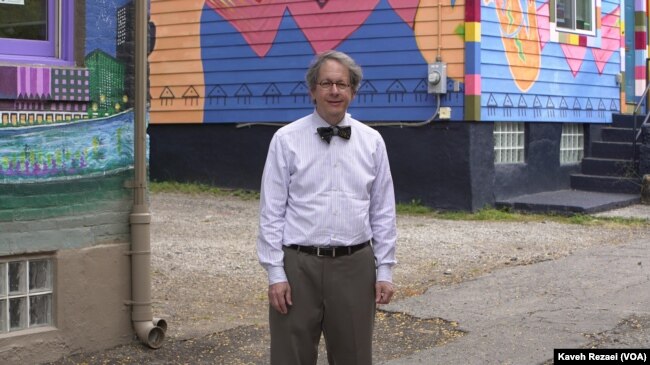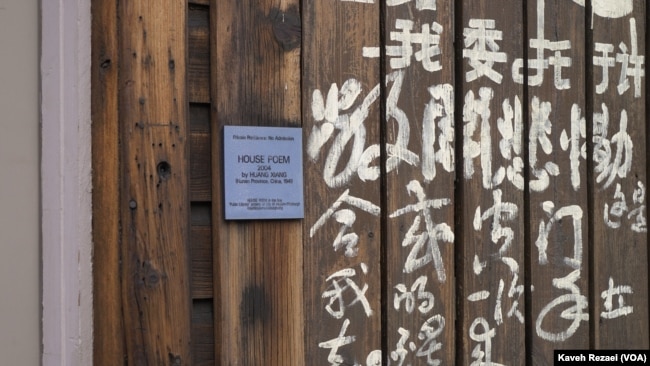Ralph Henry Reese remembers clearly the day he and his wife decided to start City of Asylum Pittsburgh.
It was in 1997. He and his wife, Diane Samuels, were attending a talk by British Indian writer Salman Rushdie at the University of Pittsburgh. The famous author had just started making public appearances again after several years of hiding.
Rushdie’s 1989 novel ‘The Satanic Verses’ had offended many Muslims because of its portrayal of Islam. After its publication, the Supreme Leader of Iran issued a fatwa ordering Rushdie’s execution.
While in hiding, Rushdie and other writers in danger formed the International Parliament of Writers.The group urged cities in Europe to provide support and safety for writers in exile. These cities became known as “Cities of Asylum.” Writers who stayed in these cities could feel safe and secure again. More importantly, they could also enjoy freedom of expression again.
Rushdie spoke about the Cities of Asylum in that 1997 talk at the University of Pittsburgh. Almost immediately, Reese and Samuels started thinking about how they could make Pittsburgh a city of asylum, too.

Henry Reese, Co-founder of City of Asylum Pittsburgh
Reese grew up near Pittsburgh in a small town called Homestead, Pennsylvania. The area was home to one of the first big steel plants in the United States.
“A very famous small town because it was the site of the original labor riots back in the early steel industry. And it was sort of legendary and it was a much-studied community because of the turmoil and the immigrants in the community and the diversity of the people.”
For much of his adult life, Reese was an entrepreneur. He owned his own business. He describes himself as being able to create and develop ideas.
And in 1997, a new idea presented itself. Rushdie’s mention of European cities of asylum made Henry Reese and Diane Samuels think about how they – and the city of Pittsburgh – might be able to help writers in exile.
“He [Rushdie] talked briefly about the City of Asylum network in Europe. And Diane and I had a house at the time. We were renting out -- it had been at one time a crack house and we had acquired it to keep it from becoming a crack house again. And we thought, ‘what a perfect house for a writer.’”
Shortly after hearing Rushdie’s talk, Ralph Henry Reese wrote to the Cities of Asylum network in Europe. He expressed interest in giving a writer in danger to a safe place to live.
Several years went by before Reese and Samuels heard anything. Then, in 2003, they received an email. The Cities of Asylum program was looking to expand in the United States.
And one year later, the City of Asylum Pittsburgh opened its doors.
“City of Asylum Pittsburgh began to provide sanctuary to a writer exiled under threat of persecution. Persecution meaning the writer could be endangered with prison, violence or censored in a way that you can’t publish freely.”
City of Asylum Pittsburgh’s first writer was Huang Xiang, a poet from China.
“When he came here he wanted to celebrate his freedom. He had never been allowed to express himself. [He had] never been published. He'd been tortured where his mouth had been beaten in so he couldn't even recite his poetry publicly, or they try to prevent it.”
When Huang arrived in Pittsburgh, Reese says, he wanted to “carve his poetry into the mountains outside the city.”
Huang spoke little English. He communicated through his wife, who translated for him. At first, Reese and Samuels thought they might have misunderstood Huang’s wishes.
"And we thought ‘Oh are we really hearing this?’”
Indeed, that was Huang’s wish. But, Samuels came up with an easier way for Huang to display his words.
“So Diane came up with the idea of putting his poetry on the outside of the house there. So he immediately came and did this beautiful calligraphy. It became a landmark instantly people came looking for it. He would come out and perform at his house.”
The row house was once a drug house. Now, it is decorated with Chinese poetry. Huang’s home is known as “House Poem.”
Today, City of Asylum Pittsburgh is made up of several row houses on the block of Samsponia Way. Its other houses have names. The names serve as reminders of the exiled writers who have lived there.
City of Asylum Pittsburgh has provided homes for exiled writers from six countries: China, El Salvador, Burma, Venezuela, Iran and Bangladesh. The program gives the writers a place to live, an income and medical benefits. It also provides support for them to continue being who they are: writers.
“We feel it’s extremely important that the writer maintain the identity of being a writer and the only way to do that, in exile, is to be published in the country you’re in.”
Reese says the City of Asylum Pittsburgh offers its writers a chance to express themselves freely, without threat. And for some, that feeling is entirely new.
“Freedom of expression can inspire many people in a deep way. This is a country -- the United States is a country -- where First Amendment rights and the idea to speak your mind is just so deeply ingrained that I think that is fundamental and everybody feels that is a sense of entitlement.
“But, I think everybody in this community understands the value of what we have here, and is more committed to understanding the meaning of creative expression, First Amendment rights in a different way, than maybe we did before. Because we have monuments in our midst, living monuments, who represent what it's like to lose that.”
I’m Marsha James.
________________________________________________________________
Words In This Story
appearance – n. the way that someone or something looks
portrayal – n. the act of showing or describing someone or something especially in a painting, book, etc.
fatwa – n. a ruling on a point of Islamic law given by a recognized authority.
turmoil – n. a state of confusion or disorder
crack house – n. a house or apartment where the illegal drug crack is made, used or sold
sanctuary – n. a place where someone or something is protected or given shelter
endangered – adj. seriously at risk or in danger
persecution - n. the unfair or cruel treatment treat of someone, especially because of race or religious or political beliefs
tortured – v. to cause someone to experience severe physical pain especially as a form of punishment to force that person to do something or say something
carve – v. to create something by cutting into a surface
calligraphy – n. the art of making beautiful handwriting
landmark – n. an object or structure on land that is easy to see and recognize
row house – n. a house in a row of houses that shares a wall with the houses next to it
entirely – adv. completely or fully: not lacking or leaving out any part
First Amendment – an amendment to the U.S. Constitution, ratified in 1791 as part of the Bill of Rights, prohibiting Congress from interfering with freedom of religion, speech, assembly, or petition.
ingrained – adj. existing for a long time and very difficult to change
fundamental – adj. forming or relating to the most important part of something
entitlement – n. the condition of having a right to have, do or get something
commitment – n. a promise to do or give something
midst – n. used to say that someone is among the people in a group







0 comments:
Post a Comment